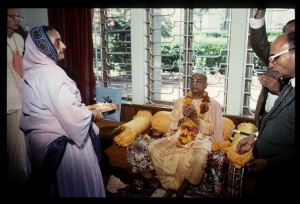SB 9.23.18-19

A.C. Bhaktivedanta Swami Prabhupada
TEXTS 18-19
duṣmantaḥ sa punar bheje
sva-vaṁśaṁ rājya-kāmukaḥ
yayāter jyeṣṭha-putrasya
yador vaṁśaṁ nararṣabha
varṇayāmi mahā-puṇyaṁ
sarva-pāpa-haraṁ nṛṇām
yador vaṁśaṁ naraḥ śrutvā
sarva-pāpaiḥ pramucyate
SYNONYMS
duṣmantaḥ—Mahārāja Duṣmanta; saḥ—he; punaḥ bheje—again accepted; sva-vaṁśam—his original dynasty (the Pūru dynasty); rājya-kāmukaḥ—because of desiring the royal throne; yayāteḥ—of Mahārāja Yayāti; jyeṣṭha-putrasya—of the first son, Yadu; yadoḥ vaṁśam—the dynasty of Yadu; nara-ṛṣabha—O best of human beings, Mahārāja Parīkṣit; varṇayāmi—I shall describe; mahā-puṇyam—supremely pious; sarva-pāpa-haram—vanquishes the reactions of sinful activities; nṛṇām—of human society; yadoḥ vaṁśam—the description of the dynasty of Yadu; naraḥ—any person; śrutvā—simply by hearing; sarva-pāpaiḥ—from all reactions of sinful activities; pramucyate—is freed.
TRANSLATION
Mahārāja Duṣmanta, desiring to occupy the throne, returned to his original dynasty [the Pūru dynasty], even though he had accepted Maruta as his father. O Mahārāja Parīkṣit, let me now describe the dynasty of Yadu, the eldest son of Mahārāja Yayāti. This description is supremely pious, and it vanquishes the reactions of sinful activities in human society. Simply by hearing this description, one is freed from all sinful reactions.